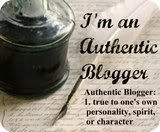"Arguing that anonymity on the Internet is dangerous, Schmidt had reportedly said, 'In a world of asynchronous threats, it is too dangerous for there not to be some way to identify you.'
He also said governments may eventually put an end to anonymity. 'We need a (verified) name service for people," he said. "Governments will demand it.'"
He goes on to say that this is different from privacy, and that privacy is crucial on the Net, and that people's private information should be secured. (Given their recent issue with private data, I think he's partially covering his ass there, but who knows?)
I think I see what he's getting at, in regards to the difference between privacy and anonymity, and it's something that I kind of share, at least in an ideal world.
The relative anonymity of the Internet gives a lot of idiots out there the empowerment to be assholes without having to account for what they say. As somebody recently said (I think it was on the Ricochet podcast, actually), it allows them to yell at and insult the 250-pound football player when they wouldn't say any such thing to the guy's face because they know they'd get a beating. Or throw out gratuitous insults, race-baiting, or any other kind of vulgar stuff without having to actually face up to the person they're saying it to.
In that way, anonymity on the Net is really bad.
On the other hand, I think it's a treasured institution for a couple of other reasons.
Of course, there's the old standby of whistle-blowers, damaged and abused people who don't want to be found by their tormentors, and the like. Those people should be protected.
But there are also those people who are doing totally legitimate things but that just "look" bad to other people, like your employer or potential employer.
The recent "RealID" kerfuffle around Blizzard and World of Warcraft, where Blizzard was going to force users to use their RealID names if they wanted to post to the Blizzard forums, is a perfect example. (Blizzard has since backed off on this plan)
In this day and age, potential employers are going to do more than just interview you. They're going to look you up on the Net too. It's one thing if they find that you posted a bunch of racist stuff on the Net somewhere. Of course it's a good thing that they found out before they hired you.
But what if your potential boss just thinks spending all of your non-work hours playing WoW and posting on its forums is a complete waste of time, and he doesn't want to hire anybody who would do that?
Why should you be penalized for that? Yes, it's wrong for a boss to think that. But there's nothing illegal about it. There are laws against not hiring people because they're disabled, but there's no law that says they can't refuse to hire you because you spend 8 hours a night playing World of Warcraft.
This is my roundabout way of saying that yes, there should always be a way for somebody who absolutely needs to (like law enforcement) to find out who's behind activities on the Internet. In that way, anonymity should go away.
But basic anonymity, which would require work or official authorization for somebody to find out who you are, that should be a bedrock of the Internet.
There has to be a better way of dealing with douchebags on the Internet than requiring *everybody* to be totally open about who they are.
As I said. In an ideal world, it would be really nice if people had to be public and had to own up to their words.
But we don't live in a perfect world.















This scares me. Partly because I don't know how it will affect me.
ReplyDeleteIs that because of certain issues that you've mentioned to me in the past?
ReplyDelete